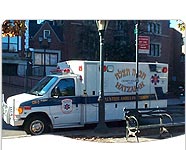 
Atrial Fibrillation Confers Greater Stroke Risk In Women Than In Men
Reuters Health: The results of a Danish study strongly indicate that the risk of stroke
imposed by atrial fibrillation (AF) is significantly greater in women than in men.
"This finding is supported by other studies," Dr. Jens Friberg from Bispebjerg University
Hospital in Copenhagen noted in comments to Reuters Health. "Therefore, when evaluating
patients with atrial fibrillation for anticoagulant therapy, the patient's gender should be taken
into account as an independent risk factor," the researcher added.
Dr. Friberg and colleagues used The Copenhagen City Heart Study, a population-based
prospective cohort study, to analyze the gender-specific impact of atrial fibrillation on the risk
of stroke and cardiovascular death.
Among a total of 29,310 subjects, 276 (110 women and 166 men) had atrial fibrillation.
During roughly 5 years of follow-up, a total of 635 strokes were recorded, 35 of which occurred
in subjects with atrial fibrillation (22 women and 13 men).
In multivariate analysis, "the effect of atrial fibrillation on the risk of stroke was 4.6-fold
greater in women (hazard ratio 7.8) than in men (hazard ratio 1.7)," the Danish team reports
in the October 1st American Journal of Cardiology.
There were a total of 1122 deaths due to cardiovascular causes during follow up, 63 of
which occurred in subjects with atrial fibrillation (28 women and 35 men). "The independent
effect of atrial fibrillation on cardiovascular mortality rate was 2.5-fold greater in women
(hazard ratio 4.4) than in men (hazard ratio 2.2)," according to the team.
The current study provides no clues as to why atrial fibrillation imposes a markedly greater
risk of stroke and death in women than in men. "The observed stronger effect of atrial fibrillation
in women may be a result of gender-specific differences in the activation of platelets and/or
coagulation during atrial fibrillation," the authors suggest, "although we have no data to support
this theory."
Am J Cardiol 2004;94:889-894.
The above is for general informational purposes only. Always consult your
physician regarding specific medical issues and call Hatzalah or your local
ambulance service in the event of an emergency.
Back to Digest Index
|









